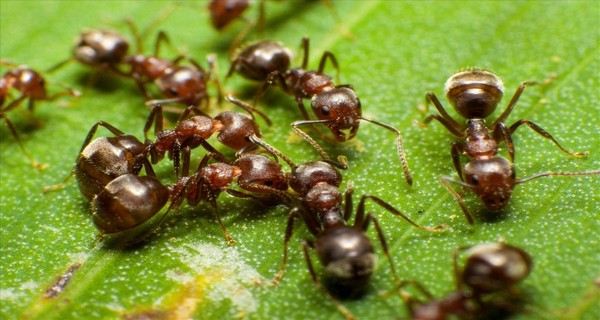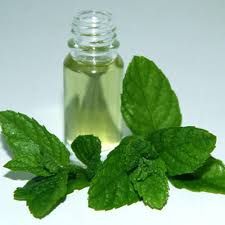Ad Blocker Detected
Our website is made possible by displaying online advertisements to our visitors. Please consider supporting us by disabling your ad blocker.
How to Get Rid of Carpenter Ants

Insects are persistent in finding ways to invade our homes, seeking leftover food and causing damage to the structures. Among the various invaders, carpenter ants are particularly concerning for homeowners. These ants have a habit of damaging wood by nesting and tunneling inside it. They often make nests in wall voids, hollow doors, beams, cabinets, and structural lumber. If you find yourself facing a carpenter ant infestation, there are natural ways to get rid of them.
Unlike termites, carpenter ants do not consume wood for food; rather, they burrow into it to establish their nests. These large black ants prefer damp and decaying lumber as it facilitates their excavation process. Outside, you may come across carpenter ant nests in tree limbs, stumps, and branches.
While they are outdoors, carpenter ant colonies generally don’t cause significant harm. However, once they find their way inside, they will forage for savory and sweet foods to bring back to their main colony. It’s essential to address carpenter ant infestations promptly to protect your home from their destructive behavior.
Table Of Contents
- What do Carpenter Ants Look Like?
- Signs You Have a Carpenter Ant Infestation
- Getting Rid of Carpenter Ants Naturally
- Food Grade Diatomaceous Earth
- Boric Acid
- White Vinegar
- Liquid Dish Soap
- Peppermint Essential Oil
- Put Up Defensive Barriers
- Does Neem Oil Kill Ants?
- Commercial Pest Control Methods
- How to Prevent Carpenter Ants from Returning
What do Carpenter Ants Look Like?
Carpenter ants are notably larger compared to other ant species, reaching sizes of up to ¾ of an inch in length. Although most carpenter ants are black, certain species may display reddish-brown or yellowish hues.
During the spring, black carpenter ants tend to enter homes. However, their presence inside does not automatically indicate a carpenter ant problem. If you’re worried about the carpenter ants you encounter in your house, you’ll need to ascertain whether they are entering from the outside or if there is an established nest within your home. This distinction is crucial in determining the appropriate course of action to address the situation effectively.
Signs You Have a Carpenter Ant Infestation
One clear indication of a carpenter’s ant infestation is the presence of worker ants inside your home. However, this alone does not guarantee that the entire colony, along with any satellite colonies, has set up its nest within your home.
Carpenter ants burrow into wood to create their nests, and as a result, you might hear rustling sounds coming from inside walls or woodwork. In more severe infestations, you may observe carpenter ant damage, which often manifests as wood shavings under window sills and other wooden objects in your home. These signs can help you identify the extent of the infestation and take appropriate measures to address the problem.
Getting Rid of Carpenter Ants Naturally
When faced with a carpenter ant infestation, your initial response might be to contact a local pest control company specializing in pest management. However, it’s essential to be aware that many of the products these companies use contain toxic chemicals that can be harmful to your family and the environment. Prolonged exposure to such commercial insecticides may lead to respiratory disorders when inhaled.
For a more effective and safer approach, consider using home remedies to eliminate carpenter ants from your home. Here’s a guide on how to get rid of carpenter ants using safe and natural ingredients.
Food Grade Diatomaceous Earth
Diatomaceous earth, often referred to as DE, is a 100% organic and natural powder enriched with silica. It proves to be an extremely effective solution for eliminating carpenter ants, aphids, and various other troublesome insects both inside and outside the home. This insecticide dust is lethal to insects and is composed of the fossilized remains of minuscule algae known as diatoms.
The remarkable effectiveness of DE lies in the razor-sharp edges of the diatoms. These edges puncture through the insects’ delicate exoskeletons, causing them to dehydrate as their moisture is extracted, ultimately leading to their demise. When you identify the nest location, you can apply diatomaceous earth to eradicate the entire colony.
use a device such as a medicine dropper to carefully inject the diatomaceous earth (DE) into the nest, allowing the fossilized diatoms to take effect. Besides carpenter ants, DE can effectively eliminate various other pests like ants, roaches, fleas, and more. Its versatility makes it a valuable solution for tackling multiple pest issues.
One of the significant advantages of using food-grade DE is its safety around pets and children, making it a non-toxic option for pest control. Additionally, it is a cost-effective method, providing an affordable and practical alternative to conventional chemical insecticides.
Boric Acid
Boric acid, a colorless and odorless powder, possesses remarkable antibacterial, antifungal, and antiviral properties. When applied to carpenter ants, the dry powder adheres to their exoskeleton. As the ants groom their legs and consume the boric acid, it acts as a stomach poison, ultimately leading to their demise.
Here’s a recipe for homemade boric acid carpenter ant bait:
Ingredients:
- ½ cup of sugar
- 3 tablespoons of boric acid
In a small container, combine the sugar and boric acid thoroughly. Sprinkle this mixture around the areas of your home where you suspect the carpenter ants are entering. The enticing sweetness of the sugar will attract the ants, but the toxic effects of the boric acid will ensure their demise.
You can utilize this mixture for perimeter treatments around your home, enabling the carpenter ants to carry the tiny particles back to their satellite nests, thereby eradicating the entire colony.
White Vinegar

White vinegar, a common household item, proves to be a practical and effective solution for carpenter ant control. Its five percent acidity makes it highly toxic to these ants, and the strong odor acts as a natural deterrent.
To utilize white vinegar as a carpenter ant control method, follow these steps:
- Mix equal parts white vinegar and water in a spray bottle.
- Directly spray the solution into a carpenter’s ant nest to eliminate the entire colony.
- Use the vinegar and water mixture as a perimeter spray, applying it around your home, particularly at entry points.
By employing this simple and natural remedy, you can effectively keep carpenter ants at bay and safeguard your home from their presence.
Liquid Dish Soap
Soap & Water Spray
Surprisingly, one of the most straightforward and highly effective methods for eradicating carpenter ants involves using a simple combination of all-natural liquid soap and water. Rather than acting as a deterrent, this safe solution serves as a potent insecticide that can eliminate these ants effectively.
The soap and water mixture blocks the carpenter ants’ ability to receive oxygen and disrupts their respiratory system. With a straightforward process of mixing liquid soap and water, and then spraying the solution on the ants and affected areas, you can typically wipe out an entire ant colony within a week to ten days.
To create this solution, mix three parts water with one part liquid soap and ensure thorough mixing. Use a hand-held spray bottle to apply the mixture. Spray the entrance and any affected areas you can access, ensuring thorough coverage. To be effective, make sure the entrance is saturated with the spray and not just slightly damp. This natural soap and water solution proves to be an efficient and environmentally friendly way to eliminate carpenter ants from your home. Product Affiliate Link: Sonett Organic Dishwashing Liquid
To maximize the effectiveness of the soap and water solution, repeat spraying daily. For optimal results, apply the spray in the evening as the sun goes down. Carpenter ants are most active at night and tend to come out around sunset. By spraying at this time, you increase the likelihood of targeting the ants as they go about their activities.
In about seven to ten days, you should observe a significant reduction in the carpenter ant population. After this period, revisit the area to ensure that the colony has been completely eliminated. Consistent and diligent application of the soap and water mixture will help you successfully combat the carpenter’s ant infestation and ensure a pest-free home.
Peppermint Essential Oil
Peppermint essential oil serves as a remarkable organic insect repellent, effectively deterring carpenter ants and spiders from your home in a natural way. Ants typically leave scent trails to guide their fellow ants toward food and water sources. However, the potent aroma of peppermint oil disrupts their ability to follow these trails and hinders their ability to detect any nearby food sources.
The added benefit of using peppermint oil as a natural ant repellent is that it is safe for pets. Most essential oils are not potent enough to affect dogs or cats, making it a pet-friendly option for ant control. By using peppermint essential oil strategically, you can keep carpenter ants and other unwanted pests at bay while ensuring a safe environment for your furry companions.
DIY Peppermint Ant-Repellent Spray

Create a powerful homemade ant repellent using the following essential oils:
Ingredients:
- 15 drops peppermint oil
- 5 drops of lavender oil
- 5 drops citronella oil
- 1 ½ cups distilled water
Instructions:
- Fill a spray bottle with distilled water.
- Add the essential oils to the spray bottle and securely fasten the cap.
- Shake the bottle vigorously to ensure thorough mixing of all the ingredients.
- Spray the solution around your kitchen and any other areas where ants might be entering your home.
Additionally, you can take these extra steps to enhance the effectiveness of the peppermint oil repellent:
- Place one drop of peppermint oil on cotton balls and position them in areas where you suspect ants are entering your home.
- Set up peppermint plants near your doorways to act as natural barriers, preventing ants from entering your home.
With this natural and aromatic ant repellent, you can keep ants at bay and maintain a pest-free environment in your home.
Put Up Defensive Barriers
To prevent ants from entering your house, set up defensive barriers around potential access points such as doors, windows, cracks, and crevices in walls and baseboards. You’ll find that many of the products for creating these barriers are likely already available in your pantry. Utilizing these simple household items as barriers can effectively deter ants and keep them from invading your living space.
Natural Defensive Ant Barriers
- Turmeric
- Cinnamon
- Powdered charcoal
- A line of chalk
- Citrus oil
- Black pepper
- Vaseline
- Baby powder
- Powdered cleanser
- Baking soda
The concept behind using these natural defensive barriers is to disrupt the pheromone trails left by ants when they enter your home. By interfering with their ability to detect the scent trail, they become unable to follow the same path to their food and water source.
However, it’s important to note that while these barriers can be effective in deterring ants, they may not completely prevent them from finding alternative ways into your home. Therefore, it is advisable to combine this deterrent method with other approaches mentioned earlier, such as killing and repelling ants, to ensure comprehensive ant control and prevent any potential re-infestations.
Does Neem Oil Kill Ants?
Neem oil serves as a highly effective and safe insecticide for use around humans and pets. However, its direct impact on ants is not to kill them outright. Instead, neem oil disrupts the ants’ hormonal balance, leading to their demise before they can progress to the next stage of their life cycle.
The active ingredient, Azadirachtin, plays a crucial role in reducing the ants’ feeding activity, impeding their growth, and hindering their ability to lay eggs. While neem oil may not serve as a long-term solution to a carpenter ant problem, it can be effectively used alongside other proven methods to significantly reduce the ant population. By combining neem oil with other strategies, you can achieve a comprehensive approach to ant control and successfully manage the infestation.
Commercial Pest Control Methods
If natural home remedies fail to effectively eliminate carpenter ants from your home, it might be necessary to consider commercial insecticide products or seek assistance from a local pest control company.
Here are the top five carpenter ant killers available online or at your local home improvement store, which can provide more robust solutions to address the infestation: [List the top five products]. These options offer stronger measures to tackle the problem and help ensure your home remains free from carpenter ant infestations.
Best Commercial Carpenter Ant Killers
- Advance Carpenter Ant Bait
- TERRO Outdoor Liquid Ant Baits (Best seller on amazon)
- Maxforce Carpenter Ant Gel
- Carpenter Ant Control Kit
- TERRO Carpenter Ant and Termite Killer

